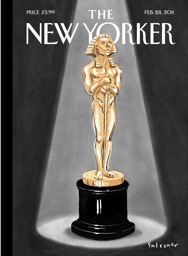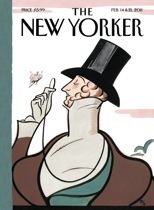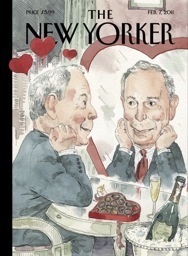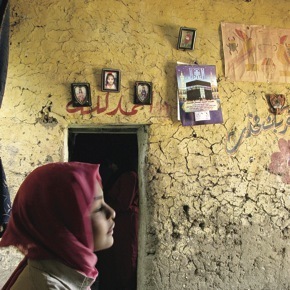Clifford Garstang's Blog, page 138
February 26, 2011
The New Yorker: "Paranoia" by Saïd Sayrafiezadeh
 First, let me say that my subscription to the print New Yorker has run out. Good riddance. I've been pretty good about getting through each issue in a timely manner—mostly because I take them to the gym and read them on the elliptical trainer—but they don't always arrive. And they almost never arrive when they're supposed to. So I've switched to a Kindle edition of the magazine. So far so good. (I was afraid I'd lose the cartoons, but, no, those are included.)
First, let me say that my subscription to the print New Yorker has run out. Good riddance. I've been pretty good about getting through each issue in a timely manner—mostly because I take them to the gym and read them on the elliptical trainer—but they don't always arrive. And they almost never arrive when they're supposed to. So I've switched to a Kindle edition of the magazine. So far so good. (I was afraid I'd lose the cartoons, but, no, those are included.)Second, this story is another one that isn't available online to non-subscribers, I'm sorry to say. There is a brief interview with the author, which you can read here, but not the story itself.
The story is about the friendship between Dean and Roberto. Dean is white, blond, employed. Roberto is an illegal immigrant from Chile (having stayed in the country after his parents' student visas expired). For a time, Dean is also out of place—he finds himself in a black neighborhood, on his way to visit Roberto in the hospital, and is nervous when three men approach him. Otherwise, Dean's life is easy, but Roberto's is not. He barely gets by, and he often needs loans from Dean. Dean comes through, but begrudgingly. At one point, Roberto reminds him that Dean is "opulent" but Roberto is "indigent" and Dean has to admit that his friend is right. And, of course, Roberto always has to worry about INS.
Three other interesting features here: Roberto's landlord is a heavily accented immigrant from somewhere, Dean's not sure where: "He was either Italian or Greek or Armenian—we could never figure out which—and he had been in America for fifty years but still could hardly speak English." The guy doesn't care much for Dean, but he's very fond of Roberto. And the story is told against a backdrop of America preparing for war. Where and against whom isn't clear, but the preparations stir up a patriotic frenzy and by the end of the story the war has begun. And Roberto himself is a puzzle. He works out and so he has an amazingly developed upper body, but he's neglected his lower body; it's as if we're being given more evidence that he's supposed to be less than a whole person.
The story, I think, deals with the American experience of the "other"—Dean's relationship with Roberto (it doesn't really feel like friendship, to me) the half-developed illegal; Dean's apprehension at finding himself in a black neighborhood; Dean's interaction with and perception of Roberto's landlord; the foreign war against an unnamed enemy, the identity of which hardly matters to the people who arrogantly assume it will be over in a matter of days.
There's not much of a plot here, honestly, but there are many intriguing layers and it's rewarding to peel them back.
February 28, 2011: "Paranoia" by Saïd Sayrafiezadeh
Published on February 26, 2011 05:54
February 24, 2011
Poetry Out Loud
 I had a new experience this week: I was a judge for the regional finals (in Virginia) of Poetry Out Loud, the national high school poetry recitation competition. This is such a great project that I don't know why more schools in our area don't participate. (As it was, we had as many judges as contestants, which was kind of silly.)
I had a new experience this week: I was a judge for the regional finals (in Virginia) of Poetry Out Loud, the national high school poetry recitation competition. This is such a great project that I don't know why more schools in our area don't participate. (As it was, we had as many judges as contestants, which was kind of silly.)It really couldn't be simpler. Students memorize and recite poems. The school runs a competition and then the winners of that competition go to the regionals. The top two from the regionals get a paid trip to the state finals. The winners from the state finals go to the national championship, and the top finishers there get some great scholarships--the grand champion gets $20,000. Not chump change.
In the regional round, each student recited two poems. (We did one round, took a break, and then came back for round 2.) The organizers did what they could to ease the nerves of the kids, which was nice: they all got a chance to try out the microphone, and then before they recited they each had a little conversation with Tom, the emcee, so they'd get comfortable standing on stage. They were still nervous, but I think it helped some.
The job of the judges was to give scores based on presence, voice, difficulty, understanding, and dramatic appropriateness. This was tough, but I've seen hundreds of poetry readings over the past decade, so I have a pretty good sense of these categories. Difficulty is the hardest to score, I thought, and depended on my own reading of the poems (which I did in advance).
Winners were declared. Refreshments were served.
I wouldn't mind doing this again next year, but I hope more schools send students to the contest.
Published on February 24, 2011 08:04
February 19, 2011
The New Yorker: "The Other Place" by Mary Gaitskill
 Yikes. Not sure I've read Gaitskill before, so I was looking forward to this one. But I think I regret it. Narrator's son Doug, 13, seems a little disturbed, but maybe not so different from other kids (which is even more disturbing). He likes violent video games (and violent drawings that seem related to the games) and hates almost everything else (although he does seem to respond to fishing with his father). He's also got a speech impediment and a tremor.
Yikes. Not sure I've read Gaitskill before, so I was looking forward to this one. But I think I regret it. Narrator's son Doug, 13, seems a little disturbed, but maybe not so different from other kids (which is even more disturbing). He likes violent video games (and violent drawings that seem related to the games) and hates almost everything else (although he does seem to respond to fishing with his father). He's also got a speech impediment and a tremor.All of that is revealed in the first couple of paragraphs and we're prepared for a story about a twisted boy, but it turns out that the story is mostly about Doug's father, the narrator, who isn't much different from his son, and has done some pretty twisted things of his own. The mother's got a checkered history herself. No wonder the kid is messed up.
But the father: he's always had an active, violent fantasy life and even became sexually aroused at the thought of killing a woman. He spied on the girl next door, but, fortunately, didn't turn her into a victim. He followed a college girl with a view to making her his victim—by then he possessed a gun he'd stolen from a friend's father—but that didn't work. Finally, though, he hitchhikes and is picked up by a woman whom he then threatens to kill.
Meanwhile, we learn that the narrator's mother was high-class hooker before she got married, and wasn't much better after she divorced his father. And she says she was abused as a kid. Hmm. So--another troubled childhood.
A key, perhaps: "The hurts of childhood that must be avenged: so small and so huge." The line suggests to me that "the other place" where the narrator retreated as a boy for his violent fantasies, and where he sees his son going now in and out of video games, is a product of "the hurts of childhood." This makes all the more important the connection that the narrator thinks he can make with his son while they are fishing: "The second time I put my hand on Doug's shoulder, he didn't move away inside; he was too busy tuning in to the line and the lure." The narrator knows that "the other place" is inside him, but at least his son won't be alone.
February 14 & 21, 2011: "The Other Place" by Mary Gaitskill
Published on February 19, 2011 08:36
February 17, 2011
AWP 2011 Conference -- DC
 I can't believe how long it's been since I posted! My only excuse is that I was wrapped up with AWP in DC—panels, readings, parties—and have been recovering and catching up ever since. Even now I don't have much to say, so I thought I'd make a few observations about the conference:The 2011 running of the writers, also known as the Conference of the Association of Writers and Writing Programs, is history. Although many had travel disruptions due to weather conditions in the Midwest and New England, my conference went very smoothly. I drove up to DC on Wednesday afternoon. The weather was beautiful and the counter-rush hour traffic was relatively light. It had been awhile since I'd driven in DC, but I managed to avoid wrong turns and managed to pull into the Marriott's parking garage exactly 2.5 hours after I left home. Plenty of time to check in, register for the conference, and find the pubs where various groups of friends had arranged to meet (two simultaneous parties, right next door to each other, one for Zoetrope Virtual Studio members and one for alums of the Virginia Center for the Creative Arts).
I can't believe how long it's been since I posted! My only excuse is that I was wrapped up with AWP in DC—panels, readings, parties—and have been recovering and catching up ever since. Even now I don't have much to say, so I thought I'd make a few observations about the conference:The 2011 running of the writers, also known as the Conference of the Association of Writers and Writing Programs, is history. Although many had travel disruptions due to weather conditions in the Midwest and New England, my conference went very smoothly. I drove up to DC on Wednesday afternoon. The weather was beautiful and the counter-rush hour traffic was relatively light. It had been awhile since I'd driven in DC, but I managed to avoid wrong turns and managed to pull into the Marriott's parking garage exactly 2.5 hours after I left home. Plenty of time to check in, register for the conference, and find the pubs where various groups of friends had arranged to meet (two simultaneous parties, right next door to each other, one for Zoetrope Virtual Studio members and one for alums of the Virginia Center for the Creative Arts).Thursday and Friday were something of a blur. I'm not sure what I did when. I attended some panels and even took notes at a couple of them, one of which I'll blog about separately. I also went to several talks and readings, including evening presentations by Jhumpa Lahiri (a keynote address, rather than a reading) and Junot Diaz, and a fantastic reading sponsored by the National Book Critics Circle that featured Elizabeth Strout (reading from Olive Kitteridge), Edward P. Jones (The Known World), Colson Whitehead (Sag Harbor), Jayne Anne Phillips (Lark & Termite), and Chimamanda Ngozi Adichie (reading new work—always a bold move). That's a lot of fire power in one reading.
Then there were some nice dinners in area restaurants with friends, a noisy party for everyone, Queens MFA happy hour in the hotel bar, the Sewanee Writers Conference Alumni reception, drinks at the bar with various friends . . . typical AWP stuff. I never did make it to an offsite event.
Saturday, though, was the main event for me. First was a panel presentation called "Small Ships, Deep Oceans: How Independent Presses Keep Short Story Collections Afloat." I had organized the panel and so moderated a discussion among five story-writing friends: Mary Akers, Laura van den Berg, Jim Ruland, Jason Ockert, and David Mullis. Despite our 9:00am start time, we had about 60 people, and by all reports the discussion was well received.
After that I had book-signing duty at the Press 53 table in the Bookfair. That was fun and we actually sold a fair number of books, plus we got to talk to lots of people who stopped by the table. I then tried to get to a couple of other panels, but they were packed, so I bagged it and hung around the Bookfair, although I did have lunch with the other panelists on my 3:00pm panel, which was the next part of the program for me: "Link it up: Working with Story Cycles, Linked Collections, & Novels in Stories" moderated by Anne Sanow and featuring Dylan Landis, Cathy Day, and me. The panel was in a room with about 100 seats and we were massively over capacity—I estimated the crowd to be 160, with people sitting on the floor behind the dais, in front of it, all along the aisle, and standing in the back, with some even standing out in the hall straining to hear through the open doors. Wow. Again, we heard good reports about that panel as well. (I plan to blog separately about both of these panels, so I'll leave it at that for now.)
And then—another reading, more socializing, and the conference was over. But we'll get to do it all over again next year in Chicago . . .
Published on February 17, 2011 10:09
February 7, 2011
The New Yorker: "Honor" by Tessa Hadley
 The narrator here is Stella, looking back at her childhood living alone with her mother, Edna. We learn from the beginning that Edna doesn't always tell Stella the truth. Stella learns much later, for example, that her father isn't dead—he just left. The other presence in Stella's life is Nana, Edna's mother, whose home is sparsely furnished with items labeled, for ease of distribution after her death to various members of the family.
The narrator here is Stella, looking back at her childhood living alone with her mother, Edna. We learn from the beginning that Edna doesn't always tell Stella the truth. Stella learns much later, for example, that her father isn't dead—he just left. The other presence in Stella's life is Nana, Edna's mother, whose home is sparsely furnished with items labeled, for ease of distribution after her death to various members of the family.Edna gets a call and informs Stella that Aunt Andy will be coming to stay for a while. Stella struggles to remember her Aunt, actually the wife of a cousin of Stella's father. Stella is warned not to mention Andy's son Charlie—an admonition that tells Stella clearly that something has happened to Charlie. But where's Andy's husband? (She's not to mention him either.)
But finally Stella learns that Andy's husband, who had a history of abusing her (and whose father probably had a history of abuse also), had killed poor Charlie. There is a trial at which Andy must testify. But she gets through it and she even remarries, although she goes through a number of "hysterical pregnancies" that all around her humor: "Exacting our sympathetic good will, under false pretenses, she claimed some latitude, some indulgence, in return for the magnitude of what she had undergone, and what she had lost, which could never be restored."
If this were a story submitted in a class of mine, I might suggest that there are flashes of brilliant writing, the piece lacks both focus and a central conflict. There is tension, and there are minor conflicts, but the most obvious conflict—that between Andy and her husband—is off stage. On the other hand, the domestic abuse trope is rather tired, and what Hadley has done here by introducing the curious young Stella, is to show us the abuse from a different angle. I generally like Hadley's work, but I don't think this is her best.
I also think the story is sexist. Or, at least, it is a story in which the male characters are all absent, drunk wife-abusers. If a man wrote a story in which all the women were prostitutes or drug-abusing unfit mothers, he'd be instantly attacked by someone for his sexism. I don't really have a problem with this story on this point, but the next time someone complains about a story by a man because it is out of balance in its portrayals of the sexes, I'll thank Tessa Hadley for giving me a response.
February 7, 2011: "Honor" by Tessa Hadley
Published on February 07, 2011 16:55
February 2, 2011
Prime Decimals 5.2 is Now Live!
 Prime Decimals 5.2 is here! Enjoy work by Malaika King Albrecht, Matthew James Babcock, Nancy Carroll, Davide Hopes, John Berbrich, Tawnysha Greene, John Saller, and Paul Weidknecht.
Prime Decimals 5.2 is here! Enjoy work by Malaika King Albrecht, Matthew James Babcock, Nancy Carroll, Davide Hopes, John Berbrich, Tawnysha Greene, John Saller, and Paul Weidknecht.Also, if you're coming to AWP this week, please be sure to stop by the Press 53 table (D-17) to see us![image error]
Published on February 02, 2011 05:00
February 1, 2011
The New Yorker: "Axis" by Alice Munro
 ike many Alice Munro stories, this one covers a long period of time—fifty years. Her stories are somewhat unusual that way. The basic plot is straightforward: Fifty years ago, Grace and Avie were farm girls at the university. Grace dated Royce, a veteran. Avie dated Hugo. Grace remained a virgin while Avie and Hugo seemed to have a series of pregnancy scares until finally one of them was real and they planned to get married. In the meantime, Royce went to visit Grace and her family in the summer between school years and they plan to have sex while the overbearing mother is away for the day. But they get caught, Royce is no longer welcome, and he never has contact with Grace again. Fifty years go by and Royce runs into Avie on a train. She's had a good life and a bunch of kids, although Hugo is now dead. Royce reveals that the day he took the bus up to see Grace he glimpsed Avie in her town and he'd been tempted to get off the bus to see her. He asks if Avie would have agreed to see him and she says yes without hesitation, despite the complications it would have created. So far it's just a nice little story about these two elderly people bumping into each other on a train. But then . . .
ike many Alice Munro stories, this one covers a long period of time—fifty years. Her stories are somewhat unusual that way. The basic plot is straightforward: Fifty years ago, Grace and Avie were farm girls at the university. Grace dated Royce, a veteran. Avie dated Hugo. Grace remained a virgin while Avie and Hugo seemed to have a series of pregnancy scares until finally one of them was real and they planned to get married. In the meantime, Royce went to visit Grace and her family in the summer between school years and they plan to have sex while the overbearing mother is away for the day. But they get caught, Royce is no longer welcome, and he never has contact with Grace again. Fifty years go by and Royce runs into Avie on a train. She's had a good life and a bunch of kids, although Hugo is now dead. Royce reveals that the day he took the bus up to see Grace he glimpsed Avie in her town and he'd been tempted to get off the bus to see her. He asks if Avie would have agreed to see him and she says yes without hesitation, despite the complications it would have created. So far it's just a nice little story about these two elderly people bumping into each other on a train. But then . . .Royce, who is a geologist, points out a formation they pass on the train: the Frontenac Axis. Unlike the neat slabs of limestone that are the surrounding countryside, the Axis "is nothing less than an eruption of the vast and crazy old Canadian Shield, all the ancient combustion cutting through the limestone, pouring over, messing up those giant steps." And then he advises her to watch for it if she passes that way again.Surely this is significant for Munro, especially given the title. I suspect that Royce himself represents the Axis—the disorderly in life—and that Avie's own life has been like the neat slabs of limestone. If she passes this way again, Munro must be saying, Avie might want to go for a little of the ancient combustion instead.
Yes? Am I reading too much into it? Apologies to those without a subscription as this story is not available on line.
January 31, 2011: "Axis" by Alice Munro[image error]
Published on February 01, 2011 15:49
January 30, 2011
The New Yorker: "Naima" by Hisham Matar
 This story has the feel of a novel excerpt. Hisham Matar has a new novel coming out in August and I wouldn't be surprised if this story is extracted from it. It's interesting anyway, although it seems overwritten to me.
This story has the feel of a novel excerpt. Hisham Matar has a new novel coming out in August and I wouldn't be surprised if this story is extracted from it. It's interesting anyway, although it seems overwritten to me.The author was born of Libyan parents who lived in Tripoli and Cairo. The narrator's parents live in Cairo, but are from elsewhere—a country the narrator doesn't name. But since it's a two-day drive from Cairo, Libya seems to fit. The parents are in exile—the father was a government minister and advisor to the king who fell in a revolution.
In the story, the mother dies—of what we don't know. But then the narrator learns the timeline of how the maid, Naima, came to live with them, and the timing of his birth and first months of life when they were exiled in Paris. The suggestion is that Naima is actually the mother, I suppose, although that is only hinted.I suppose I should read the story again, but I hate the online version of the magazine and once again my issue has failed to show up—now nearly 10 days late. So I'll leave it at that.
January 24, 2011: "Naima" by Hisham Matar (not online)
Published on January 30, 2011 11:51
AWP is coming
 I'm not sure I've ever gone a whole wee without posting before. I apologize! I've been awfully busy this week as I prepare for next week's 2011 AWP Conference in DC.
I'm not sure I've ever gone a whole wee without posting before. I apologize! I've been awfully busy this week as I prepare for next week's 2011 AWP Conference in DC.When I tell people, even many writers, that I'm going to AWP, they often stare at me blankly and I have to explain. AWP is the Association of Writers and Writing Programs (so it should be AWWP, right?) and every year they hold an amazing conference in late winter or early spring. (Last year's was in Denver in April, so it seems early to be doing this again. Next year it's in Chicago at the end of February into early March.))
The conference this year runs from Thursday, Feb. 3 through Saturday Feb. 5 and it is non-stop. Check out the schedule. There are hundreds of panels, readings, discussions, receptions, and parties. This year there are over 6,000 people registered for the conference. It's a blast.
But I'll be busy, and that's why I've already been busy getting ready. I'm on two panels. The first is about how small, independent presses are helping to keep short story collections going (since it's difficult to get a story collection published by a big house). The second is about linked story collections. I figure both of these will be appealing topics to people, but they're at terrible times--one is first thing on Saturday morning and the other is at the end of the day on Saturday, when everyone is sick of panels. We'll see how it goes. That part of it is out of my control.
The highlight of the conference for me, though, is the bookfair. That runs the whole three days an includes 500 or so exhibitors--small presses and literary magazines, mostly, and other organizations or service providers that are related. Press 53 will have a table (D17) at the bookfair--my book will be available there and on Saturday morning I'll be on hand to sign copies--and I'll also be at the table to talk about Prime Number Magazine, the journal I edit that is published by Press 53. Come by for free stuff.
Published on January 30, 2011 10:42
January 22, 2011
Submissions, Acceptances, and the other things
 For much of 2010 I wasn't doing a lot of submitting to magazines. I was working on a novel so not producing any new stories. And for some reason I stopped sending out some older pieces that haven't yet found a home. Plus I was busy with Prime Number Magazine, and . . . you see I had lots of excuses.
For much of 2010 I wasn't doing a lot of submitting to magazines. I was working on a novel so not producing any new stories. And for some reason I stopped sending out some older pieces that haven't yet found a home. Plus I was busy with Prime Number Magazine, and . . . you see I had lots of excuses.But the novel is done, for now. While its fate is being determined, I'm back to writing stories. So far I'm cleaning up some unfinished pieces and dusting off a few others--like the unpublished stories from my second linked story collection. And I've begun to send them out.
And just to underscore the reason I really enjoy writing and submitting stories, one short piece (from yet another collection of linked shorts) has landed at Northville Review, an online journal. It's called "In Hoan Kiem Lake" and I think it will be up in March.
I'll be sending more pieces out soon . . .
Published on January 22, 2011 06:41



